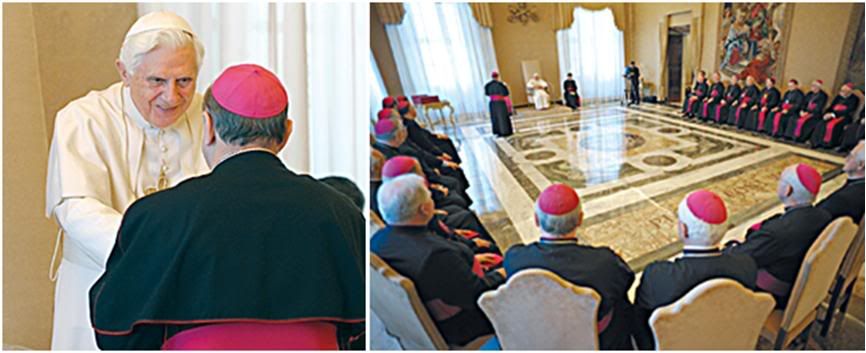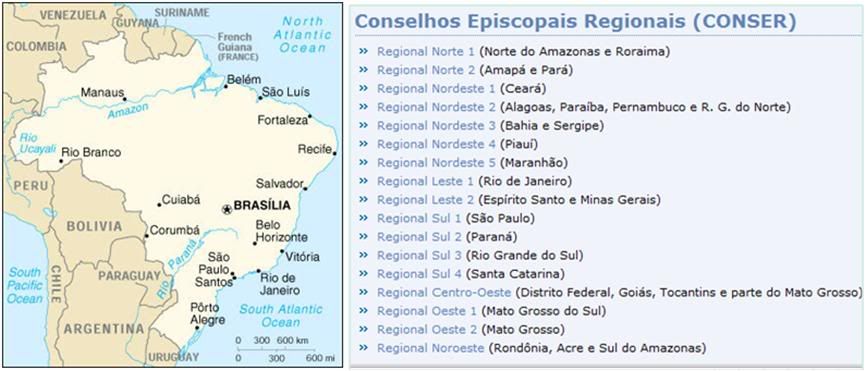| | | OFFLINE | | Post: 19.017
Post: 1.664 | Registrato il: 28/08/2005
Registrato il: 20/01/2009 | Administratore | Utente Veteran | |
|

 Earlier entries for 12/5/09 are on the preceding page.
Earlier entries for 12/5/09 are on the preceding page.
 The Holy Father took a surprising tack in his address to the bishops of southern Brazil on ad limina visit whom he addressed Saturday noon at the Consistory Hall of the Apostolic Palace, after having met with them in separate groups earlier in the week. Here is how L'Osservatore Romano reports it.
To the bishops of southern Brazil:
The Holy Father took a surprising tack in his address to the bishops of southern Brazil on ad limina visit whom he addressed Saturday noon at the Consistory Hall of the Apostolic Palace, after having met with them in separate groups earlier in the week. Here is how L'Osservatore Romano reports it.
To the bishops of southern Brazil:
Catholic schools serve society
like other educational institutions
Benedict XVI also warns them against
the deceptive principles of liberation theology
Translated from
the 12/6/09 issue of


"The Catholic school cannot be thought nor live separately from other educational institutions", the Pope reiterated Saturday in addressing the Bishops of Brazil's southern ecclesiastical sectors 3 and 4 on ad limina visit.
He addressed them in Portuguese at the Consistory Hall of the Apostolic Palace. Here is a translation:
Venerated Brothers in the Episcopate,
I welcome and greet each and everyone of you as I receive you colegially during your ad-limina visit. I thank Mons. Murilo Krieger for teh words of detion and esteem that he addressed to me in your name and for teh people entrusted to your pastoral care in ecclesiastical sectos 3 and 4.
Listening t you, my heart gives thanks to the Lord for the gift of faith mercifully bestowed on your ecclesial communities where it is zealously conserved and courageously passed on, in obedience fo the mandate that Jesus left us to bring his Good News to every creature, seeking to pervade the present culture with Christian humanism.
With respect to culture, my thought goes to the two classic environments where it is formed and communicated - the university and the school, with particular attention on the academic communities born under the unbrella of Christian humanism, inspired by it, and honored with the name 'Catholic'.
Now, "it is precisely in the explicit reference to the Christian vision that is shared by all the members of the scholastic community, even if in various degrees, that a school is 'Catholic', insofar as the evangelical principles become its educational norms, its interior motivations as wel as its final ends" (Congregation for Catholic Education, 'The Catholic School", No. 34).
May the Catholic school, in synergy with families and with the ecclesial community, promote that unity of faith, culture and life which constitues the fundamental objective of Christian education.
Even public schools, according to their different forms and modes, can be aided in their educational task by the presence of professorts who are believers - especially but not ex clusively professors of the Catholic religion - and of Christianly formed students, as well as the collaboration of families and the Christian community itself.
Indeed, healthy secularity in schools does not imply the negation of transcendence nor even a mere neutrality in the face of those moral requisites and values that are the basis of authentic human formation, including religious instruction.
The CAtholic school cannot be thought of nor live separate from other educational institutions. It is at the ser5vice of society. It carries out a public function, a service of public utility which is not reserved for Catholics, but open to all who desire to avail of its well-qualified educational offering.
The problem of its juridical adn economic equiparation to the public school can be correctly posed only if we start from recognizing the primary role of families and the subsidiary role of other educational institutions.
Article 26 of the Universal Declaration of Human Rights says: "Parents have the right od priority in the choice of the kind of isntruction that they wish to give their children".
The plurisecular task of the Catholic school goes in this direction, impelled by an even more radical force, that which makes Christ the center of the educational process.
This process, which begins in the primary adn elementary schools, is completed in the highest and most specialized way in universities. The Church has always been supportive of the university and its vocation of leading man to the highest levels of knowledge of the truth and of mastery of the world in all its aspects.
I am happy to express my great ecclesial gratitude to the various religious congregations who have established and sustained renowened universities among you, but reminding them nonetheless that the schools are not the property of those who founded them or those who attend them bit an expression of the Church and her patrimony of faith.
In this sense, dear friends, it is worth remembering that, last August, it was 25 years since the Instruction Libertatis nuntius was issued by the Congregation for the Doctrine of the Faith on some aspects of the theology of liberation.
It udnerscored the danger that came with the acritical acceptance by some theologians of theses and methodologies derived from Marxism. Itsmore or less visible consequences in the form of rebellion, division, dissent, offensiveness and anarchies are still felt today, creating great suffering and a serious loss of living forces in your diocesan communities.
I beg of those who feel in some way attracted to, involved in or topuched in their own heart by some deceptive principles of liberation theology, to take a look once again at this Instruction and accept the benign light that it holdss out.
It reminds everyone that "the supreme rule of our faith... comes from the unity that the Spirit has imposed among Sacred Tradition, Sacred Scripture, and the Magisterium of teh Church, in a reciprocity in which none of them can subsit independently" (John Paul II, Fides et ratio, no. 55).
So also it points out that in the case of ecclesial organizations and communities, forgiveness that is offered and accepted in the name and for the love of the Most Holy Trinity, whom we adore in our hearts, may put an end to the suffering of our beloved Church that is a pilgrim on the earth of the Holy Cross.
Venerated brothers in the episcopate, in the union with Christ, we are preceded and led by the Virgin Mary, so loved and venerated in your dioceses and in all Brazil.
In Her, we find, pure and undeformed, the true essence of the Church, and so, through her, let us learn to know and love the mystery of the Church that lives in history let us feel ourselves profoundly part of her, let us become in our turn 'ecclesial spirits', leading to resist that 'internal secularization' that threatens the Church and its teachings.
As I ask the Lord to infunse the abundance of his light on the entire Brazilian world of education, I entrusts her leading players to the protection of the Most Holy Virgin, and I impart on you, your priests, the religious and the committed laity, and all the faithful in your dioceses, a paternal apostolic blessing.
Brazil is so large, both in physical land areas, as well as in population, that a quick review of its Catholic statistics is always helpful:


 The blue-shaded area on the map, left, represents South Sector-3&4 from which this week's visiting bishops come from. The map on the right shows the various regions of Brazil, which has a total of 267 dioceses.
The blue-shaded area on the map, left, represents South Sector-3&4 from which this week's visiting bishops come from. The map on the right shows the various regions of Brazil, which has a total of 267 dioceses.
[Modificato da TERESA BENEDETTA 06/12/2009 05:45] |